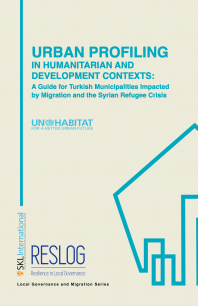Urban profiling in humanitarian and development contexts: A Guide for Turkish Municipalities Impacted by Migration and the Syrian Refugee Crisis

The guide on urban profiling for local authorities in Turkey, by UN-Habitat and SKL International’s RESLOG Turkey, builds upon UN-Habitat’s extensive global experience on urban and neighborhood profiling.
The guide introduces urban profiling as a process for collecting and analyzing data on the conditions in an urban area or neighborhood. Combining maps, visualizations and quantitative data, urban profiling can help to reflect the needs, vulnerabilities and capacities of urban systems and population groups that reside in those urban settings. It draws on the collective knowledge of national and local players, humanitarian and development actors, built environment professionals, private sector, civil society and host and migrant/refugee communities – maximizing the contributions of all. Through the participation of different stakeholders in the data collection and assessment, the following prioritization of issues builds upon a collaborative understanding and broad ownership of decisions. The spatial organization and presentation of data enables decisionmakers to understand multi-sector linkages and identify vulnerabilities (e.g. disaster risk prone areas) and underserviced areas of cities as well as outline opportunities for tangible transformation of urban areas that benefit all population groups.
Urban profiling is usually accompanied by capacity building activities for local actors, in order to ensure that data collection leads to transformative change and builds upon a joint vision for sustainable urban development.
There is no need for a one-size-fits-all methodology and process for urban profiling. Urban profiling can be adapted based on the type of crisis and along all stages of the humanitarian-development nexus, tailored to context, actors involved, most pressing questions at hand, the availability of reliable quantitative and qualitative data, and last but not least, the operational realities of the situation, which differ largely even within a city.
Further information on UN-Habitat’s work in urban migration and displacement contexts, can be found under the Migration and UN-Habitat’s flagship programme on Inclusive Cities: Enhancing the positive impact of urban migration